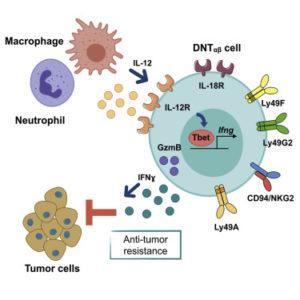Neutrophils are the first line of defence against micro-organsims, and play an important role in regulating both innate and adaptive immune response. Neutrophils have also been suggested to play a role in tumor pathology, where studies have reported a positive association between high neutrophil levels and tumor progression. Researchers from Europe (Ponzetta et al.,) aimed to determine immunological effects of tumor-associated neutrophils (TAN) in the tumor microenvironment.
Ponzetta et al., used a murine model of 3-methyl-cholanthrene (3-MCA) induced carcinogenesis in mice that lacked granulocyte-colony stimulating factor receptor (G-CSF-R). They chose to utilise G-CSF-R deficient mice, because this model has been successfully used to determine the role of tumor-associated macrophages in the tumor microenvironment.
They showed increased tumor incidence and growth in G-CSF-R KO mice compared with mice that expressed G-CSF-R. Increased immunopathology was associated with lower levels of IL-12 production, which lead to lower levels of IFN-γ production. IL-12 is predominantly produced by macrophages, which in turns activates production of IFN-γ in classical T cells. In absence of G-CSF-R in vivo transfer of neutrophils restored IL-12 dependent IFN-γ production. Mechanistically, researchers showed that IL-12 production by neutrophils induced IFN-γ production in unconventional (αβ-double negative) T cells but had no effect on classical (CD4 and CD8) T cells, additionally IFN-γ production by unconventional cells contributed to anti-tumor immunity. Lastly, researcher also showed that in some human cancer studies, an increase in TAN and detection of increased neutrophil signatures was associated with low tumor pathology and increased cancer patient survival.
In summary, this study highlights a role of neutrophils in unconventional T cell mediated tumor resistance, as well the use of TAN as a potential biomarker for tumor progression or survival of cancer patients.
Journal Article: Ponzetta et al., 2019. Neutrophils Driving Unconventional T Cells Mediate Resistance against Murine Sarcomas and Selected Human Tumors. Cell











